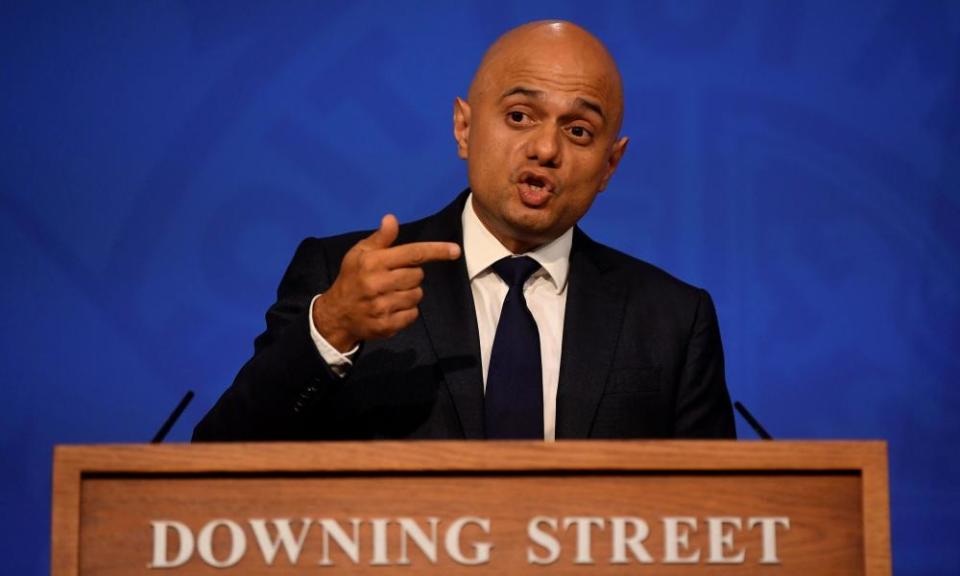The Guardian view on the Covid surge: no more room for complacency

Post-lockdown Britain is sailing dangerously close to the wind. Wednesday’s tally of 49,139 cases is far higher than equivalent figures being recorded elsewhere in Europe. Hospitalisations and deaths are on the rise, and one in five intensive care beds is currently occupied by a Covid patient. The NHS – struggling to deal with a waiting list of 6 million people – has warned that if the escalation in cases is not checked, invidious decisions will have to be taken about priorities. Exhausted staff, too few in number, say they are on the cusp of being overwhelmed. And winter has yet to begin.
Given that darkening context, Sajid Javid’s first Covid press conference did very little to reassure. Mr Javid’s announcement that two new anti-viral drugs, which reduce the severity of Covid infections, may be available in months, was very good news. But as the NHS Confederation calls for urgent measures to prevent an imminent crisis, it was also a distraction. On the issue of the day, the health secretary flatly rejected the idea that the pressures on the NHS were becoming unsustainable, despite admitting that Covid cases could rise as high as 100,000 a day. He offered instead a pep talk to the public, urging it to remember to act cautiously when mixing.
Have we not been here before? It is hard not to conclude that Boris Johnson’s penchant for panglossian leadership is again leaving the government looking complacent and slow to act with precautionary speed. After the prime minister lifted all restrictions during the summer, a predicted surge in infections to very high levels did not materialise. This led to hopes that a “plan B” – reintroducing measures such as mandatory mask-wearing, vaccine passports and working from home – would never be necessary. In the absence of effective messaging to the contrary, a large section of the population came to believe the pandemic was effectively over, and the government lost its focus when it came to driving the delivery of third, booster injections to older people. About 30 million people are eligible for a jab; 4 million have so far received one. A collective sense of urgency has been absent.
The autumnal surge of Covid infections is taking place for a combination of reasons. Most of the UK population was double-vaccinated earlier than most other countries, so more people are reaching the point when immunity gradually begins to wane. That is not the government’s fault. But other factors have been under its control. The vaccination of teenagers has taken place far more slowly than, for example, in Spain, leading to spiralling transmission within English schools. Reverting to libertarian type, Mr Johnson’s government moved well ahead of others, including in the rest of Britain, in relaxing rules on mask-wearing. During the summer it shelved the idea of requiring vaccine passes for mass gatherings.
This free-and-easy approach, and the absence of cautionary public messaging, was intended to maximise the economic benefits of opening up. Setting a tone in such a way inevitably led large swathes of the population to revert to pre-pandemic behaviour. This makes sending the right messages and getting them heard much more difficult. Mr Javid’s belated warning that the pandemic is not over followed months of laissez-faire laxity.
The vaccination rollout has, of course, transformed the Covid landscape for the better, greatly reducing the possibility of severe outcomes after infection. But the government has repeatedly stated that it will intervene if it appears the NHS risks being overwhelmed. Clearly, this is now close to being the case. A more cautious approach to everyday life may again become necessary during the treacherous winter to come. The government has a responsibility to get ahead of this inconvenient truth and lead.

 Yahoo News
Yahoo News 